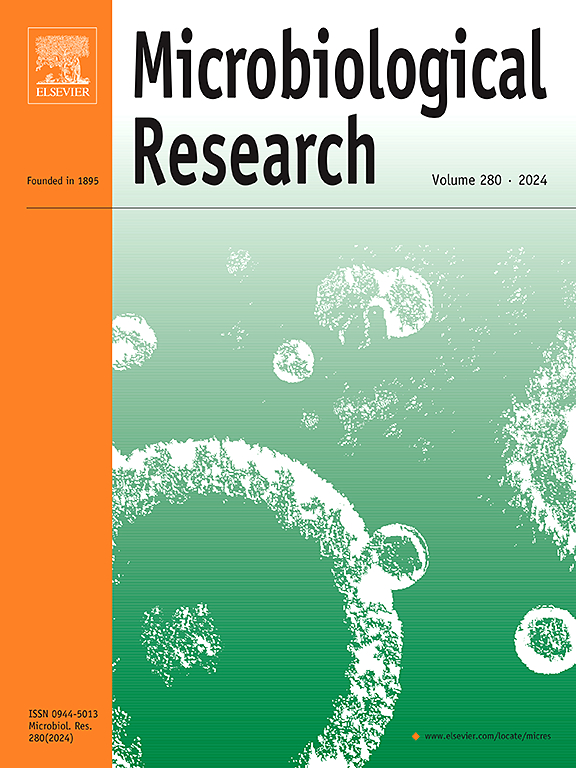解密植物与病毒之间错综复杂的相互作用:Potyvirids协调蛋白质翻译后修饰以调节致病性。
IF 6.1
1区 生物学
Q1 MICROBIOLOGY
引用次数: 0
摘要
在病毒与其宿主之间的分子军备竞赛中,病毒已经进化到利用宿主的翻译后修饰(PTMs)机制来获得竞争优势。这些修饰是植物病毒克服宿主防御以成功感染的最可靠目标。目前对调控植物病毒与植物相互作用的 PTMs(即磷酸化、O-GlcNAcylation、泛素化和 SUMOylation)的研究相对较少。因此,值得注意的是,壶状病毒(壶状病毒科成员)绑架宿主防线的这一被削弱但却关键的策略的重要性和潜力,建议详细回顾这些 PTMs 的现有知识,并强调可能在建立成功感染中发挥作用的未探索的修饰。本综述介绍了 PTMs 如何在植物-植物病毒相互作用过程中执行病毒复制和感染动态。我们强调,与 CP、NIa-pro、NIb 和 VPg 相关的 PTM 对于指定宿主、毒力、克服宿主先天免疫以及最重要的解除宿主的 RNA 沉默工具以钉死任何入侵者都很重要。在植物-病毒相互作用的过程中,研究被破坏的 PTMs(包括乙酰化、糖基化、甲基化和内切酶化)的局限性和潜在改进,以及这一不可避免的过程所面临的挑战和未来展望,都将从机理上得到破解。这篇通讯为研究病毒感染的基本机制以及为可持续的疾病管理开发新的抗病毒策略开辟了新的途径。本文章由计算机程序翻译,如有差异,请以英文原文为准。
Deciphering intricate plant-virus interactions: Potyvirids orchestrate protein posttranslational modifications to regulate pathogenicity
In a molecular-arm-race between viruses and their hosts, viruses have evolved to harness their host's post-translational modifications (PTMs) machinery to gain a competitive edge. These modifications are the most reliable target of plant viruses to overcome the host defence for successful infection. Relatively fewer PTMs i.e., phosphorylation, O-GlcNAcylation, Ubiquitination, and SUMOylation have been studied regulating the potyvirus-plant interaction. Therefore, it is worth drawing attention towards the importance and potential of this undermined but key strategy of potyvirids (members of family Potyviridae) to abduct their host defence line, suggesting to review in detail the existing knowledge of these PTMs and highlight the unexplored modifications that might have played their part in establishing successful infection. The current review provides an understanding of how PTMs execute viral replication and infection dynamics during plant-potyvirid interactions. We highlighted that PTMs linked to CP, NIa-pro, NIb, and VPg are important to specify their host, virulence, overcoming host innate immunity, and most importantly disarming the host of RNA silencing tool of nailing any intruder. The limitations and potential improvements in studying undermined PTMs, including acetylation, glycosylation, methylation, and neddylation, as well as challenges and future perspectives of this inevitable process are mechanistically deciphered in the course of plant-virus interactions. This communication opens new avenues for investigating the fundamental mechanisms of virus infection and the development of new antiviral strategies for sustainable disease managements.
求助全文
通过发布文献求助,成功后即可免费获取论文全文。
去求助
来源期刊

Microbiological research
生物-微生物学
CiteScore
10.90
自引率
6.00%
发文量
249
审稿时长
29 days
期刊介绍:
Microbiological Research is devoted to publishing reports on prokaryotic and eukaryotic microorganisms such as yeasts, fungi, bacteria, archaea, and protozoa. Research on interactions between pathogenic microorganisms and their environment or hosts are also covered.
 求助内容:
求助内容: 应助结果提醒方式:
应助结果提醒方式:


